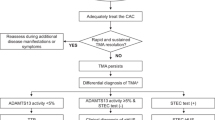Abstract
Pregnancy-associated atypical hemolytic uremic syndrome is a systemic disease associated with high morbidity and mortality rates, caused by dysregulation of the alternative complement pathway, leading to uncontrolled complement activation resulting in thrombotic microangiopathy. This condition can be effectively treated by anti-C5 therapy, which controls complement activation. Treatment can be safely discontinued after complete remission and resolution of the precipitating cause, especially in patients with a low-risk genetic profile.


Similar content being viewed by others
References
Dashe JS, Ramin SM, Cunningham FG (1998) The long-term consequences of thrombotic microangiopathy (thrombotic thrombocytopenic purpura and hemolytic uremic syndrome) in pregnancy. Obstet Gynecol 91:662–668
Fakhouri F, Roumenina L, Provot F et al (2010) Pregnancy-associated hemolytic uremic syndrome revisited in the era of complement gene mutations. J Am Soc Nephrol 21:859–867
Faguer S, Huart A, Frémeaux-Bacchi V, Ribes D, Chauveau D (2013) Eculizumab and drug-induced haemolytic-uraemic syndrome. Clin Kidney J 6:484–485
Delmas Y, Bordes C, Loirat C, Frémeaux-Bacchi V, Combel C (2013) Post-partum atypical haemolytic-uraemic syndrome treated with eculizumab: terminal complement activity assessment in clinical practice. Clin Kidney J 6:243–244
Cañigral C, Moscardó F, Castro C et al (2014) Eculizumab for the treatment of pregnancy-related atypical hemolytic uremic syndrome. Ann Hematol 93:1421–1422
Ardissino G, Wally OM, Maria BG, Rigotti A, Cugno M (2013) Eculizumab for atypical hemolytic uremic syndrome in pregnancy. Obstet Gynecol 122(2 Pt 2):487–489
Zschiedrich S, Prager EP, Kuehn EW (2013) Successful treatment of the postpartum atypical hemolytic uremic syndrome with eculizumab. Ann Intern Med 2(159):76
Kourouklaris A, Ioannou K, Athanasiou I et al (2014) Postpartum thrombotic microangiopathy revealed as atypical hemolytic uremic syndrome successfully treated with eculizumab: a case report. J Med Case Rep 8:307
Robson JS, Martin AM, Ruckley VA, MacDonald MK (1968) Irreversible post partum renal failure. A new syndrome. QJ Med 37:423
Loirat C, Frémeaux-Bacchi V (2011) Atypical hemolytic uremic syndrome. Orphanet J Rare Dis. 6:60
Anacleto FE, Cifra CL, Elises JS (2003) Postpartum hemolytic uremic syndrome in a 17-year-old Filipina primigravid. Pediatr Nephrol 18:1283–1285
McMinn JR, George JN (2001) Evaluation of women with clinically suspected thrombotic thrombocytopenic purpura-hemolytic uremic syndrome during pregnancy. J Clin Apher. 16:202–209
George JN (2003) The association of pregnancy with thrombotic thrombocytopenic purpura–hemolytic uremic syndrome. Curr Opin Hematol 10:339–344
George JN (2000) How I treat patients with thrombotic thrombocytopenic purpura–hemolytic uremic syndrome. Blood 86:1223–1229
Bresin E, Rurali E, Caprioli J et al (2013) Combined complement gene mutations in atypical hemolytic uremic syndrome influence clinical phenotype. J Am Soc Nephrol 24:475–486
Ardissino G, Testa S, Possenti I et al (2014) Discontinuation of eculizumab maintenance treatment for atypical hemolytic uremic syndrome: a report of 10 cases. Am J Kidney Dis 64:633–637
Conflict of interest
Dr. E. De Sousa acts as a scientific advisor for Alexion Pharmaceuticals. Dr. Campistol, Dr. Rodriguez de Cordoba and Mr. Blasco have received fees from Alexion Pharmaceuticals for invited lectures. The other authors declare that they have no relevant conflicts of interest.
Ethical standard
The present study was performed in accordance with the ethical standards of the institutional research committee and with the Helsinki declaration.
Informed consent
Written consent was obtained from the patient discussed and documentation is available for review upon request.
Author information
Authors and Affiliations
Corresponding author
Rights and permissions
About this article
Cite this article
De Sousa Amorim, E., Blasco, M., Quintana, L. et al. Eculizumab in pregnancy-associated atypical hemolytic uremic syndrome: insights for optimizing management. J Nephrol 28, 641–645 (2015). https://doi.org/10.1007/s40620-015-0173-5
Received:
Accepted:
Published:
Issue Date:
DOI: https://doi.org/10.1007/s40620-015-0173-5




